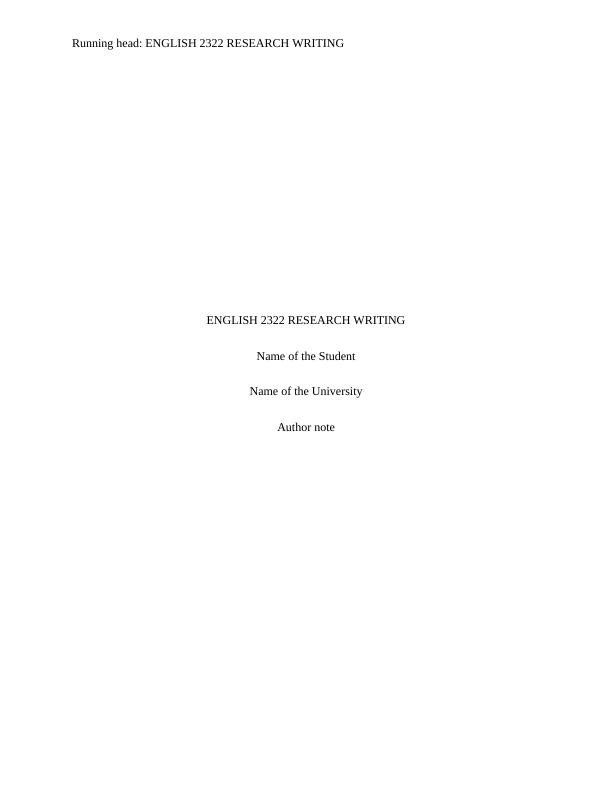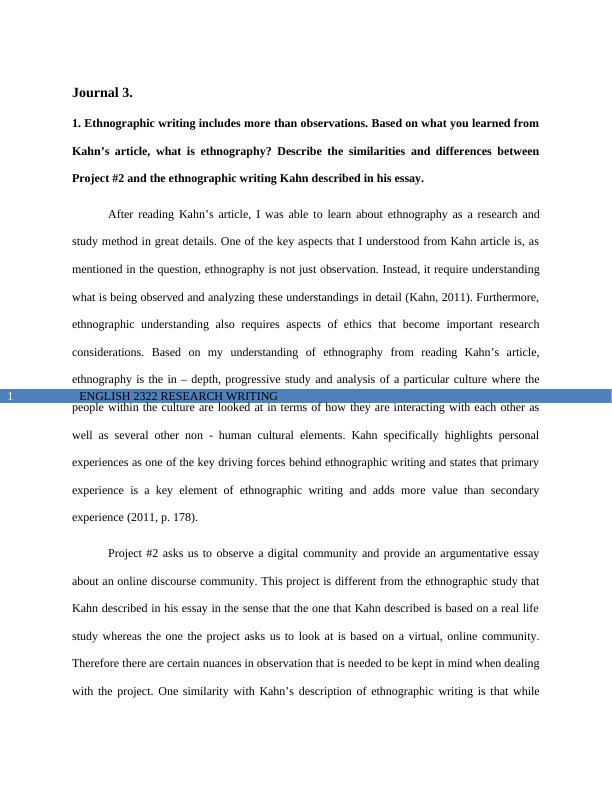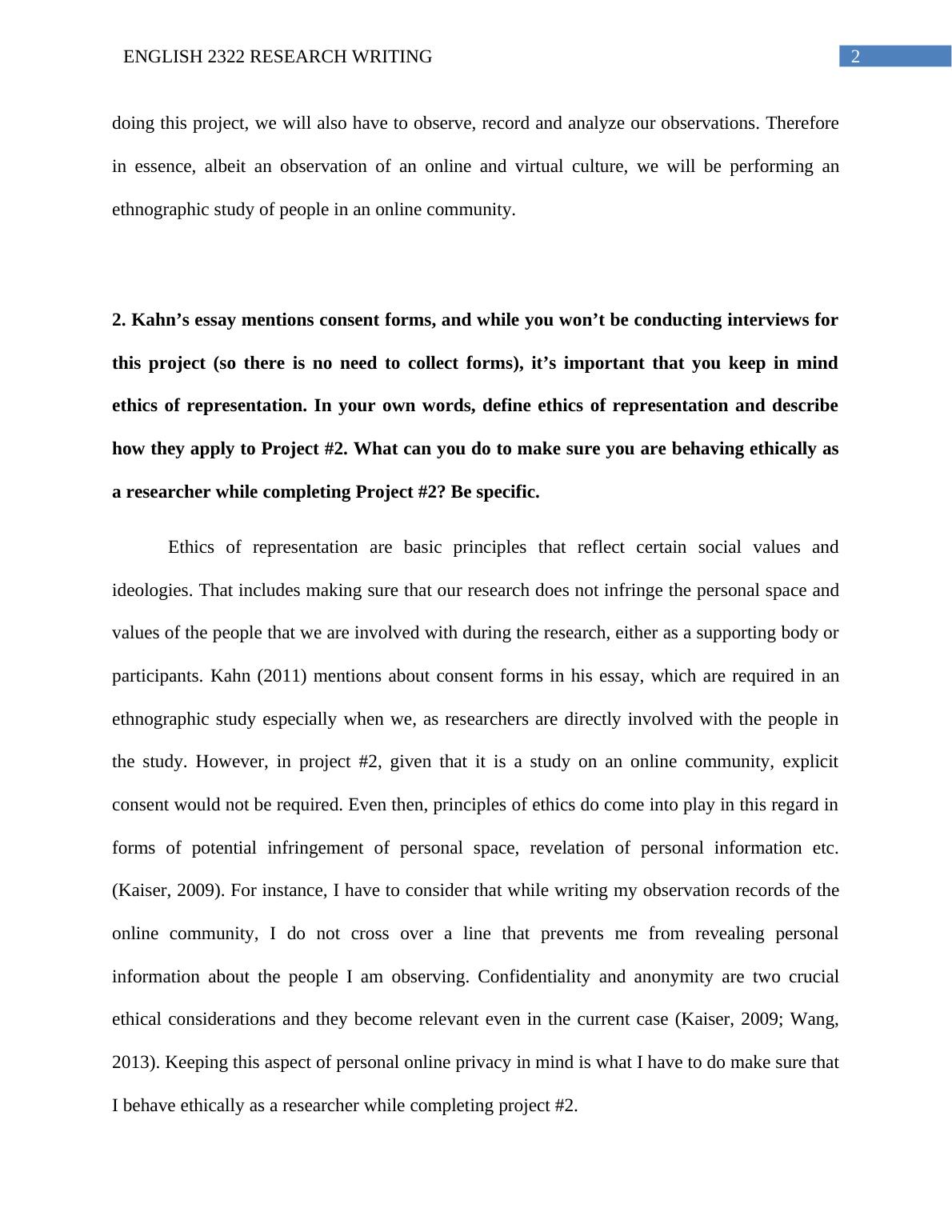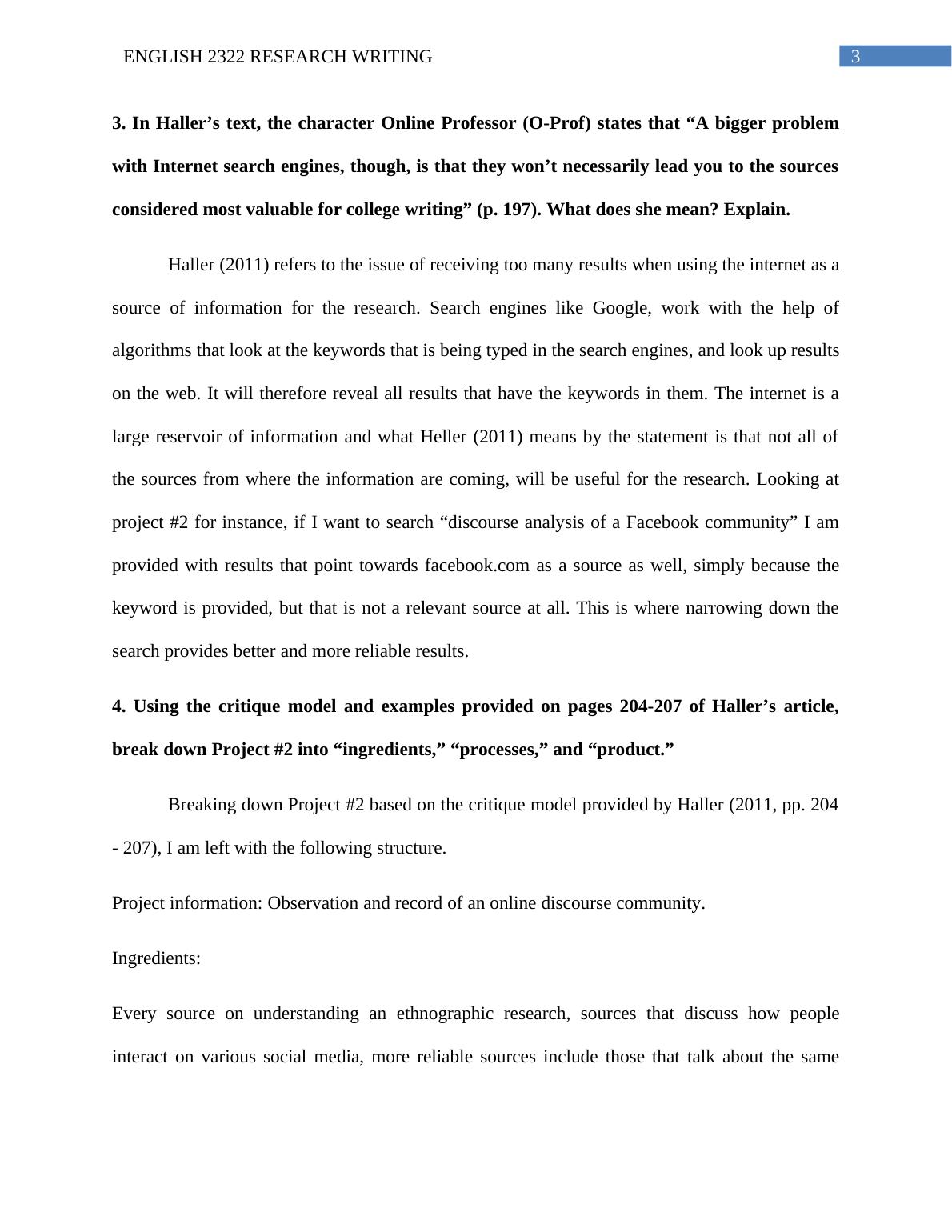International Journal of Qualitative Studies
Added on 2022-08-23
13 Pages3060 Words42 Views
Running head: ENGLISH 2322 RESEARCH WRITING
ENGLISH 2322 RESEARCH WRITING
Name of the Student
Name of the University
Author note
ENGLISH 2322 RESEARCH WRITING
Name of the Student
Name of the University
Author note

ENGLISH 2322 RESEARCH WRITING1
Journal 3.
1. Ethnographic writing includes more than observations. Based on what you learned from
Kahn’s article, what is ethnography? Describe the similarities and differences between
Project #2 and the ethnographic writing Kahn described in his essay.
After reading Kahn’s article, I was able to learn about ethnography as a research and
study method in great details. One of the key aspects that I understood from Kahn article is, as
mentioned in the question, ethnography is not just observation. Instead, it require understanding
what is being observed and analyzing these understandings in detail (Kahn, 2011). Furthermore,
ethnographic understanding also requires aspects of ethics that become important research
considerations. Based on my understanding of ethnography from reading Kahn’s article,
ethnography is the in – depth, progressive study and analysis of a particular culture where the
people within the culture are looked at in terms of how they are interacting with each other as
well as several other non - human cultural elements. Kahn specifically highlights personal
experiences as one of the key driving forces behind ethnographic writing and states that primary
experience is a key element of ethnographic writing and adds more value than secondary
experience (2011, p. 178).
Project #2 asks us to observe a digital community and provide an argumentative essay
about an online discourse community. This project is different from the ethnographic study that
Kahn described in his essay in the sense that the one that Kahn described is based on a real life
study whereas the one the project asks us to look at is based on a virtual, online community.
Therefore there are certain nuances in observation that is needed to be kept in mind when dealing
with the project. One similarity with Kahn’s description of ethnographic writing is that while
Journal 3.
1. Ethnographic writing includes more than observations. Based on what you learned from
Kahn’s article, what is ethnography? Describe the similarities and differences between
Project #2 and the ethnographic writing Kahn described in his essay.
After reading Kahn’s article, I was able to learn about ethnography as a research and
study method in great details. One of the key aspects that I understood from Kahn article is, as
mentioned in the question, ethnography is not just observation. Instead, it require understanding
what is being observed and analyzing these understandings in detail (Kahn, 2011). Furthermore,
ethnographic understanding also requires aspects of ethics that become important research
considerations. Based on my understanding of ethnography from reading Kahn’s article,
ethnography is the in – depth, progressive study and analysis of a particular culture where the
people within the culture are looked at in terms of how they are interacting with each other as
well as several other non - human cultural elements. Kahn specifically highlights personal
experiences as one of the key driving forces behind ethnographic writing and states that primary
experience is a key element of ethnographic writing and adds more value than secondary
experience (2011, p. 178).
Project #2 asks us to observe a digital community and provide an argumentative essay
about an online discourse community. This project is different from the ethnographic study that
Kahn described in his essay in the sense that the one that Kahn described is based on a real life
study whereas the one the project asks us to look at is based on a virtual, online community.
Therefore there are certain nuances in observation that is needed to be kept in mind when dealing
with the project. One similarity with Kahn’s description of ethnographic writing is that while

ENGLISH 2322 RESEARCH WRITING2
doing this project, we will also have to observe, record and analyze our observations. Therefore
in essence, albeit an observation of an online and virtual culture, we will be performing an
ethnographic study of people in an online community.
2. Kahn’s essay mentions consent forms, and while you won’t be conducting interviews for
this project (so there is no need to collect forms), it’s important that you keep in mind
ethics of representation. In your own words, define ethics of representation and describe
how they apply to Project #2. What can you do to make sure you are behaving ethically as
a researcher while completing Project #2? Be specific.
Ethics of representation are basic principles that reflect certain social values and
ideologies. That includes making sure that our research does not infringe the personal space and
values of the people that we are involved with during the research, either as a supporting body or
participants. Kahn (2011) mentions about consent forms in his essay, which are required in an
ethnographic study especially when we, as researchers are directly involved with the people in
the study. However, in project #2, given that it is a study on an online community, explicit
consent would not be required. Even then, principles of ethics do come into play in this regard in
forms of potential infringement of personal space, revelation of personal information etc.
(Kaiser, 2009). For instance, I have to consider that while writing my observation records of the
online community, I do not cross over a line that prevents me from revealing personal
information about the people I am observing. Confidentiality and anonymity are two crucial
ethical considerations and they become relevant even in the current case (Kaiser, 2009; Wang,
2013). Keeping this aspect of personal online privacy in mind is what I have to do make sure that
I behave ethically as a researcher while completing project #2.
doing this project, we will also have to observe, record and analyze our observations. Therefore
in essence, albeit an observation of an online and virtual culture, we will be performing an
ethnographic study of people in an online community.
2. Kahn’s essay mentions consent forms, and while you won’t be conducting interviews for
this project (so there is no need to collect forms), it’s important that you keep in mind
ethics of representation. In your own words, define ethics of representation and describe
how they apply to Project #2. What can you do to make sure you are behaving ethically as
a researcher while completing Project #2? Be specific.
Ethics of representation are basic principles that reflect certain social values and
ideologies. That includes making sure that our research does not infringe the personal space and
values of the people that we are involved with during the research, either as a supporting body or
participants. Kahn (2011) mentions about consent forms in his essay, which are required in an
ethnographic study especially when we, as researchers are directly involved with the people in
the study. However, in project #2, given that it is a study on an online community, explicit
consent would not be required. Even then, principles of ethics do come into play in this regard in
forms of potential infringement of personal space, revelation of personal information etc.
(Kaiser, 2009). For instance, I have to consider that while writing my observation records of the
online community, I do not cross over a line that prevents me from revealing personal
information about the people I am observing. Confidentiality and anonymity are two crucial
ethical considerations and they become relevant even in the current case (Kaiser, 2009; Wang,
2013). Keeping this aspect of personal online privacy in mind is what I have to do make sure that
I behave ethically as a researcher while completing project #2.

ENGLISH 2322 RESEARCH WRITING3
3. In Haller’s text, the character Online Professor (O-Prof) states that “A bigger problem
with Internet search engines, though, is that they won’t necessarily lead you to the sources
considered most valuable for college writing” (p. 197). What does she mean? Explain.
Haller (2011) refers to the issue of receiving too many results when using the internet as a
source of information for the research. Search engines like Google, work with the help of
algorithms that look at the keywords that is being typed in the search engines, and look up results
on the web. It will therefore reveal all results that have the keywords in them. The internet is a
large reservoir of information and what Heller (2011) means by the statement is that not all of
the sources from where the information are coming, will be useful for the research. Looking at
project #2 for instance, if I want to search “discourse analysis of a Facebook community” I am
provided with results that point towards facebook.com as a source as well, simply because the
keyword is provided, but that is not a relevant source at all. This is where narrowing down the
search provides better and more reliable results.
4. Using the critique model and examples provided on pages 204-207 of Haller’s article,
break down Project #2 into “ingredients,” “processes,” and “product.”
Breaking down Project #2 based on the critique model provided by Haller (2011, pp. 204
- 207), I am left with the following structure.
Project information: Observation and record of an online discourse community.
Ingredients:
Every source on understanding an ethnographic research, sources that discuss how people
interact on various social media, more reliable sources include those that talk about the same
3. In Haller’s text, the character Online Professor (O-Prof) states that “A bigger problem
with Internet search engines, though, is that they won’t necessarily lead you to the sources
considered most valuable for college writing” (p. 197). What does she mean? Explain.
Haller (2011) refers to the issue of receiving too many results when using the internet as a
source of information for the research. Search engines like Google, work with the help of
algorithms that look at the keywords that is being typed in the search engines, and look up results
on the web. It will therefore reveal all results that have the keywords in them. The internet is a
large reservoir of information and what Heller (2011) means by the statement is that not all of
the sources from where the information are coming, will be useful for the research. Looking at
project #2 for instance, if I want to search “discourse analysis of a Facebook community” I am
provided with results that point towards facebook.com as a source as well, simply because the
keyword is provided, but that is not a relevant source at all. This is where narrowing down the
search provides better and more reliable results.
4. Using the critique model and examples provided on pages 204-207 of Haller’s article,
break down Project #2 into “ingredients,” “processes,” and “product.”
Breaking down Project #2 based on the critique model provided by Haller (2011, pp. 204
- 207), I am left with the following structure.
Project information: Observation and record of an online discourse community.
Ingredients:
Every source on understanding an ethnographic research, sources that discuss how people
interact on various social media, more reliable sources include those that talk about the same

End of preview
Want to access all the pages? Upload your documents or become a member.
Related Documents
Impact of Globalization on Demand and Ethical Concerns of Wine Industrylg...
|17
|3071
|174
Research Approval & Ethics Formlg...
|4
|763
|37
